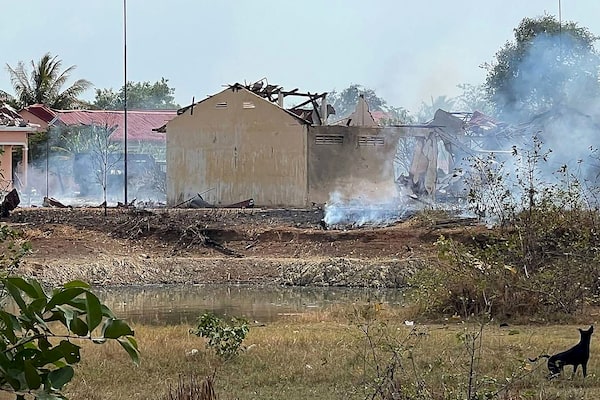
Smoke billows from the warehouse following an explosion at an army base in Kampong Speu province on April 27, 2024.-/Getty Images
An ammunition explosion at a base in southwestern Cambodia on Saturday afternoon killed 20 soldiers and wounded several others, Prime Minister Hun Manet said.
Hun Manet said in a Facebook post that he was “deeply shocked” when he received the news of the blast at the base in Kampong Speu province. It wasn’t immediately clear what caused it.
Images from the scene showed several badly damaged buildings still smouldering, at least one with its roof blown off, and soldiers receiving treatment in a hospital. Other photos showed houses with holes in their roofs.
Four buildings – three for storage and one work facility – were destroyed and several military vehicles damaged, Col. Youeng Sokhon, an army officer at the site, said in a brief report to army chief Gen. Mao Sophan, posted on social media. He added that 25 villagers’ homes were damaged as well.
Cambodia, like many countries in the region, has been suffering from an extended heat wave, and the province where the blast took place registered a high of 39 C (102 F) on Saturday. While high temperatures normally can’t detonate ammunition, they can degrade the stability of explosives over a period of time, with the risk that a single small explosion can set off a fire and a chain reaction.
Kiripost, an online English language news service, quoted a nearby resident as saying a major explosion occurred at about 2:30 p.m., followed by smaller blasts for another hour.
Pheng Kimneang was quoted as saying the windows of a factory nearby were shattered, and homes as far as a kilometre (a half-mile) away suffered minor damage. Photos of the base show it in a large field, apparently with no civilian structures close by.
Hun Manet offered condolences to the soldiers’ families and promised the government would pay for their funerals and provide compensation both to those killed and those wounded.
A graduate of the U.S. Military Academy at West Point, he was army commander before he was elected last year to serve as prime minister, succeeding his father Hun Sen, who led Cambodia for 38 years before stepping down.